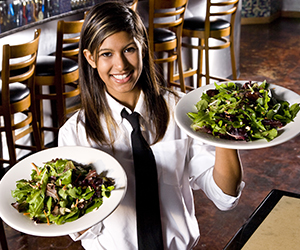The value of an Incentive Scheme
Success in the restaurant industry is built on the back of great teams. To build a great team you need dedicated, enthusiastic and reliable employees. Easier said than done in an industry notorious for its high turnover of staff. Evidence suggests that to build a great team you need to motivate. One way to do this is through an incentive scheme for staff. For other ideas check out our blog: 10 ways to motivate employees in hospitality.
Many restaurant owners are big believers in incentive schemes with evidence suggesting their benefits far outweigh costs. Restaurant and Catering Magazine cites a source the claims incentive schemes can boost the quality and quantity of restaurant staff performance by up to 40%. Here's how your restaurant can get on board.
Many restaurant owners are big believers in incentive schemes with evidence suggesting their benefits far outweigh costs. Restaurant and Catering Magazine cites a source the claims incentive schemes can boost the quality and quantity of restaurant staff performance by up to 40%. Here's how your restaurant can get on board.
Key Features of an Incentive Scheme
Achievable
A restaurant incentive scheme must be achievable. While at first glance this may be obvious, there are still plenty examples of well-managed restaurant incentive schemes that fail because they are perceived to be unattainable. Staff don't buy into the scheme from the start and the scheme may actually cause staff to become demotivated as it shows a disconnect between staff and management.
Equitable
A restaurant incentive scheme should be equitable with commensurate reward for effort. This means that the bigger the achievement, timeframe or required effort, then the larger the possible reward. This rule should apply equally across all staff members regardless of seniority.
Clarity
Staff should easily be able to identify what they need to do to qualify for a reward. The incentive scheme should clearly specify those factors with are objective and those open for appraisal and how they will be measured. There then needs to be a balance between these two variables.
Eligibility
What do staff need to do to qualify for reward under any restaurant incentive that you run? Key things to consider are:
A restaurant incentive scheme must be achievable. While at first glance this may be obvious, there are still plenty examples of well-managed restaurant incentive schemes that fail because they are perceived to be unattainable. Staff don't buy into the scheme from the start and the scheme may actually cause staff to become demotivated as it shows a disconnect between staff and management.
Equitable
A restaurant incentive scheme should be equitable with commensurate reward for effort. This means that the bigger the achievement, timeframe or required effort, then the larger the possible reward. This rule should apply equally across all staff members regardless of seniority.
Clarity
Staff should easily be able to identify what they need to do to qualify for a reward. The incentive scheme should clearly specify those factors with are objective and those open for appraisal and how they will be measured. There then needs to be a balance between these two variables.
Eligibility
What do staff need to do to qualify for reward under any restaurant incentive that you run? Key things to consider are:
- How long an employee needs to be with the restaurant to be eligible?
- What happens when an employee changes roles?
- What staff members will be eligible for which incentives?
Different Incentive Scheme Options
Simple Sales Incentive
Under this restaurant incentive scheme an employee will earn a specific amount for each unit or dollar amount sold. For example $1 for every bottle of wine ordered or $10c for every $1 spent on desserts.
Target Incentive
Staff must reach a certain target to be rewarded under this scheme. This could be in terms of the number or value of items sold. It could also be a percentage increase on items sold versus a base line figure. So for example a $5 bonus when a guest spends over $50 or a $100 bonus if sales for an individual staff member are over $2,000 or 10% more than last month.
Group Incentive
A group incentive is for all staff members and is a great way to encourage team camaraderie. Examples of this incentive could include movie tickets if the kitchen staff meet food cost targets.
Limited Time Incentives
This type of restaurant incentive is a one-off and only lasts a shift, day or week and isn't a regular occurence. For example you might need to sell some cases of slow-moving wine. You could offer a $100 incentive for the staff member who sells the most of the left over stock.
Management Incentives
Usually reserved for full-time staff in positions of seniority who have been with the restaurant longer and are likely to stick around. Management incentives are usually based on improving previous performance. For example a manager may earn a bonus if wages are kept below a certain level or sales are a percentage increase on the previous quarter, half or full year results.
Under this restaurant incentive scheme an employee will earn a specific amount for each unit or dollar amount sold. For example $1 for every bottle of wine ordered or $10c for every $1 spent on desserts.
Target Incentive
Staff must reach a certain target to be rewarded under this scheme. This could be in terms of the number or value of items sold. It could also be a percentage increase on items sold versus a base line figure. So for example a $5 bonus when a guest spends over $50 or a $100 bonus if sales for an individual staff member are over $2,000 or 10% more than last month.
Group Incentive
A group incentive is for all staff members and is a great way to encourage team camaraderie. Examples of this incentive could include movie tickets if the kitchen staff meet food cost targets.
Limited Time Incentives
This type of restaurant incentive is a one-off and only lasts a shift, day or week and isn't a regular occurence. For example you might need to sell some cases of slow-moving wine. You could offer a $100 incentive for the staff member who sells the most of the left over stock.
Management Incentives
Usually reserved for full-time staff in positions of seniority who have been with the restaurant longer and are likely to stick around. Management incentives are usually based on improving previous performance. For example a manager may earn a bonus if wages are kept below a certain level or sales are a percentage increase on the previous quarter, half or full year results.


 RSS Feed
RSS Feed